Add this eBook to your basket to receive access to all 173 records. Our indexes include entries for the spelling plumpton. In the period you have requested, we have the following 173 records (displaying 111 to 120): These sample scans are from the original record. You will get scans of the full pages or articles where the surname you searched for has been found. Your web browser may prevent the sample windows from opening; in this case please change your browser settings to allow pop-up windows from this site. Inhabitants of Liverpool
(1790-1797)
The provincial sections of the Universal British Directory include lists of gentry and traders from each town and the surrounding countryside, with names of local surgeons, lawyers, postmasters, carriers, &c. (the sample scan here is from the section for Hull). The directory started publication in 1791, but was not completed for some years, and the provincial lists, sent in by local agents, can date back as early as 1790 and as late as 1797.
| Sample scan, click to enlarge
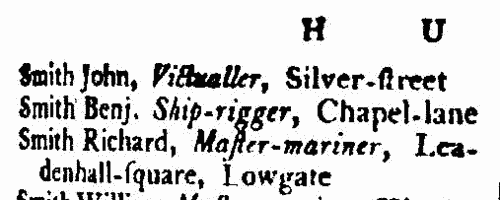
|  Masters of apprentices registered in Lincolnshire
(1798) Masters of apprentices registered in Lincolnshire
(1798)
Apprenticeship indentures and clerks' articles were subject to a 6d or 12d per pound stamp duty: the registers of the payments usually give the master's trade, address, and occupation, and the apprentice's name, as well as details of the date and length of the apprenticeship. There are central registers for collections of the stamp duty in London, as well as returns from collectors in the provinces. These collectors generally received duty just from their own county, but sometimes from further afield. The indentures themselves can date from a year or two earlier than this return. (The sample entry shown on this scan is taken from a Bristol return. Each entry has two scans, the other being the facing page with the details of the indenture, length of service, and payment of duty.) IR 1/69 | Sample scan, click to enlarge

|  Masters of apprentices registered in Norfolk
(1798) Masters of apprentices registered in Norfolk
(1798)
Apprenticeship indentures and clerks' articles were subject to a 6d or 12d per pound stamp duty: the registers of the payments usually give the master's trade, address, and occupation, and the apprentice's name, as well as details of the date and length of the apprenticeship. There are central registers for collections of the stamp duty in London, as well as returns from collectors in the provinces. These collectors generally received duty just from their own county, but sometimes from further afield. The indentures themselves can date from a year or two earlier than this return. (The sample entry shown on this scan is taken from a Bristol return. Each entry has two scans, the other being the facing page with the details of the indenture, length of service, and payment of duty.) IR 1/69 | Sample scan, click to enlarge

| Freemen of Canterbury by Redemption
(1392-1800)
No man or woman could trade in the city of Canterbury without having obtained 'freedom' of the city, unless they paid an annual fee to do so. Admissions of freemen were recorded on the Chamberlains' Accounts of the city, which were prepared annually from Lady Day (25 March) to Lady Day until 1752, and thereafter each set runs from 1 January to 31 December. The accounts for 1392 are incomplete, but thereafter until 1800 there is a complete series except for the years 1455 to 1457 and the year 1552-3. Joseph Meadows Cowper, Honorary Librarian to the Corporation, produced this extract of the names from 1392 to 1800, and the volume was privately printed in 1903. There are five groups of freemen: those who obtained freedom after serving out an apprenticeship to a freeman; the children of freemen; those who married a freeman's daughter; those who claimed freedom by 'redemption', i. e. by purchase; and those who were honoured by a gift of the freedom from the Mayor and Court of Aldermen. Cowper published his lists divided into the five categories: the sample scan is from the list of those who obtained freedom by marriage. This is the index to those who gained their freedom by redemption. | Sample scan, click to enlarge

| Lincolnshire Cottagers: Ashby cum Fenby
(1801)
Robert Gourlay published the results of a detailed survey that he had made in person travelling from village to village in Lincolnshire and Rutland, examining the state of the cottagers in each parish. After a general description of the local agriculture, he listed the cottagers by name, and, where possible, recorded the acreage of their holdings, annual rent, the number of persons in each family, and their stock, giving numbers of cows, pigs, horses &c. | Sample scan, click to enlarge

|  Apprentices registered in Lancashire
(1803) Apprentices registered in Lancashire
(1803)
Apprenticeship indentures and clerks' articles were subject to a 6d or 12d per pound stamp duty: the registers of the payments usually give the master's trade, address, and occupation, and the apprentice's name, as well as details of the date and length of the apprenticeship. There are central registers for collections of the stamp duty in London, as well as returns from collectors in the provinces. These collectors generally received duty just from their own county, but sometimes from further afield. The indentures themselves can date from a year or two earlier than this return. (The sample entry shown on this scan is taken from a Bristol return. Each entry has two scans, the other being the facing page with the details of the indenture, length of service, and payment of duty.) IR 1/70 | Sample scan, click to enlarge
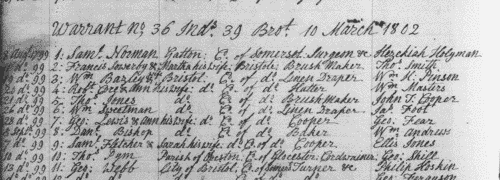
| Tradesmen of Chester
(1392-1805)
Lists of admissions of freemen of the city of Chester from the earliest surviving records to 1805 were compiled by J. H. E. Bennett and published by the Lancashire and Cheshire Record Society from 1906. These lists were extracted from the mayoral yearbooks (dating back to 1392) and twelve freemen's rolls covering 1538 to 1612 and 1636 to 1805; and a list of admissions for 1505-1506 in Harleian MS 2105 (British Library). The record does not become more or less continuous until about 1490: in all, 12,426 freedoms are recorded. Freedom of the city, necessary to practise a trade in the city, could be obtained by birth (in which case the father's name and occupation are usually given); by apprenticeship to a freeman (the master's name and occupation being given); or by order of assembly. Both the freemen and the masters listed are indexed here. The main abbreviations used are: B, freedom taken up by right of birth; I, freedom taken up by right of indenture; M. B., Mayor's Book; *, freedom granted by order of assembly. | Sample scan, click to enlarge

| Baptists in Northampton supporting Missionary Work in Bengal
(1804-1805)
The Baptist Missionary Society established a mission at Serampore in Bengal. Letters from the missionaries from 27 June 1804 to 20 October 1805 describing their work were published in England as 'Periodical Accounts relative to the Baptist Missionary Society', prefaced by 'A List of Persons baptised in Bengal, belonging to the Church of Christ at Serampore' running back to 1 November 1795. With this was this appendix, a list of subscriptions, collections and donations from 1 October 1804 to 1 October 1805, including (pages 146-150) 'Collections and Donations for Translating the Scriptures into the Eastern Languages'. | Sample scan, click to enlarge
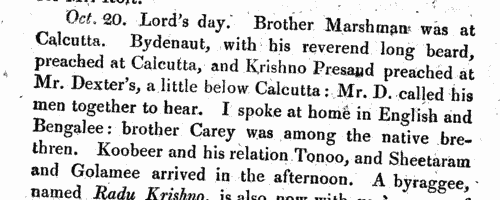
| Inhabitants of Bath, in Somerset
(1805)
Holden's Triennial Directory of 1805 to 1807 included a provincial section, listing professional people and traders in England, Wales, Scotland and Ireland. (The sample scan here is from the listing for Bath) | Sample scan, click to enlarge
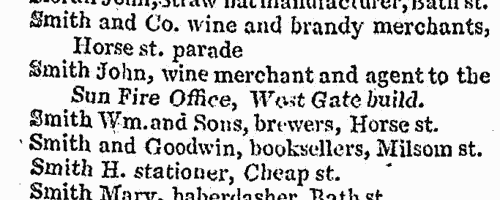
| Traders and professionals in London
(1805)
Holden's Triennial Directory for 1805 to 1807 includes this 'London Alphabet of Businesses, Professions, &c.': coverage is good; about 30,000 individuals are recorded. | Sample scan, click to enlarge
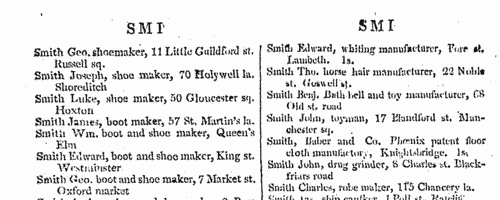
|
Research your ancestry, family history, genealogy and one-name study by direct access to original records and archives indexed by surname.
|












